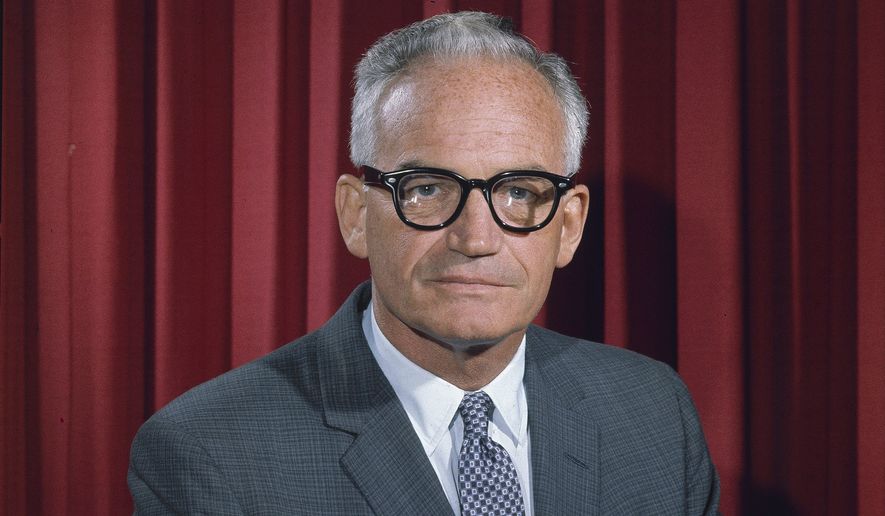OPINION:
In a very real sense, the modern conservative political movement began with Barry Goldwater. Had it not been for the Arizona senator it might have taken years or even decades for conservative ideas to break into the political mainstream, Ronald Reagan would be remembered today not as one of our greatest presidents, but as a “B” movie star and television host, and many of those who since the 1960s shaped our nation’s politics would not have had an opportunity to do so.
Goldwater seemed to young conservatives in the early 1960s like a sort of real life John Wayne, riding in from the West to do battle with the liberals and Democrats who dominated everything. The growing conservative movement had Bill Buckley, of course, but was largely composed of writers, intellectuals and students. There were a few old Taft conservatives around as well, but the new conservative movement linking believers in free-market economics with Cold Warriors and those who are today called social conservatives was in its infancy and could count few elected officials within its ranks.
Goldwater was something else. He said what he thought and had the courage to stand up for his beliefs. He had been elected by upsetting the Senate’s majority leader and could often be found standing and voting alone on the Senate floor regardless of the odds or orders from his party’s leaders. He seemed to embody Buckley’s definition of the conservative as one who “stands athwart history yelling stop.”
Columnist Robert Novak, then a moderate and critic of Goldwater, wrote that “he was a conservative who smiled, who laughed, who was young and dynamic.” He came to Washington to change things, gave hundreds or perhaps thousands of speeches around the country as chairman of the National Republican Senatorial Committee, authored a book that students and others devoured and became an instant hero to conservatives young and old.
In 1960, a reluctant Goldwater was nominated for vice president at the Republican National Convention and in withdrawing gave a speech that ignited his followers and led almost directly to his nomination four years later. He stood before the assembled delegates who had just nominated Richard M. Nixon and challenged his fellow conservatives. “Let’s grow up conservatives,” he said, “If we want to take this party back — and I think we can someday — let’s get to work.”
They did just that, building the political infrastructure that would vanquish those who had dominated the party for most of their lives and hand their hero the nomination. The sign that the conservative movement had arrived took place at Madison Square Garden two years later, The Young Americans for Freedom audaciously decided to put together a conservative rally and invite the Arizona senator, among others, to speak in what they called “the belly of the beast.” Eighteen thousand people showed up, and when Goldwater took the stage, they welcomed him in a way that told the world he was their man. Richard Viguerie, who was there and helped organize the rally, remembers it as the moment when the political conservative movement really began.
Goldwater himself had always been reluctant about running for president, but was a close friend of the incumbent Democrat, John F. Kennedy, and the two had discussed and looked forward to a campaign unlike any other in modern American history. They even talked about touring the country together on the same plane and engaging in a series of Lincoln-Douglas style debates that would give voters a chance to choose between Kennedy’s liberalism and Goldwater’s conservatism. It would have been quite a campaign, but it was not to be.
Kennedy’s death put Lyndon B. Johnson in the White House and Goldwater was not very interested in running against him and was convinced it would be almost impossible to prevail in the aftermath of the Kennedy assassination. But his followers literally forced his hand, so the reluctant candidate stepped forward, vanquished the GOP establishment and seized control of the party in a raucous San Francisco convention.
The ensuing campaign was one of the most vicious and negative in history, and that is saying something today. Goldwater was pictured as a foaming-at-the-mouth madman who would destroy the world, who had secret ties to German neo-Nazis, would end Social Security and plunge America into depression. He lost, of course, by a huge margin. And the establishment thought the conservative movement he led had been destroyed once and for all.
Things would return to normal with Democrats and “respectable” Republicans differing on the margins, but agreeing on major issues. The intellectual elite that had so hated Goldwater and his advisers (like the eccentric Milton Friedman) who they felt gave the senator crazy economic advice would vanish and the world would go on as it had.
They were wrong, of course, because Barry Goldwater in losing had changed their world and ours in ways they couldn’t imagine. They saw his defeat as the end, but were soon to discover that it was only the beginning.
• David A. Keene is opinion editor of The Washington Times.




Please read our comment policy before commenting.